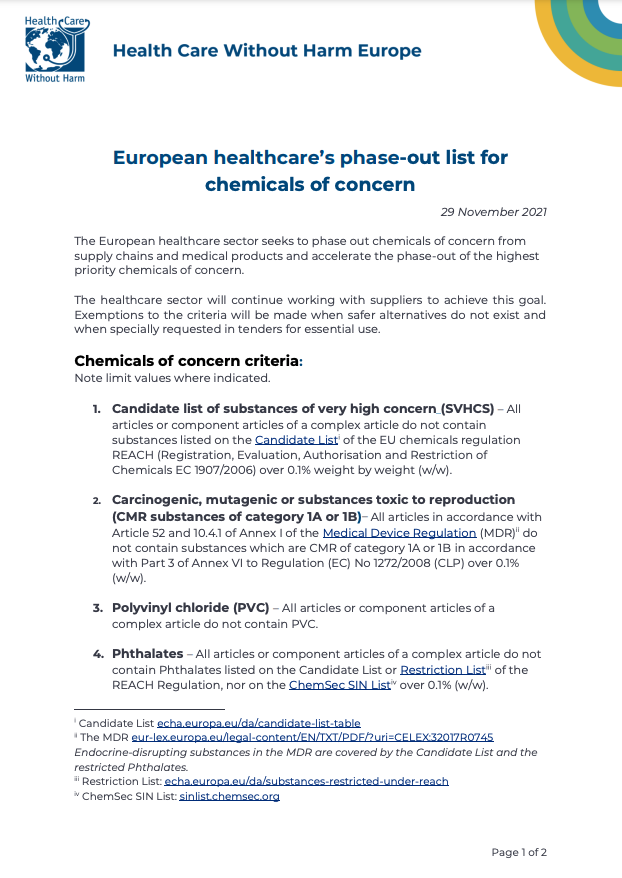
A blog post by Katia Pacella,
Circular Healthcare Projects Officer
The European Commission’s recently published Restrictions Roadmap represents the EU’s most significant commitment to the Green Deal’s Chemicals Strategy for Sustainability, by promoting rapid decisions on group restrictions for toxic chemicals in all applications. This is a pivotal moment for the European healthcare sector and a crucial opportunity to align chemical requirements for the phase-out of harmful chemicals from healthcare products.
The roadmap is a prioritised list of harmful chemicals to be restricted as a group across broad uses, instead of regulating the substances one by one for specific applications. This approach is crucial to avoid regrettable substitutions and speed up the phase-out of the most harmful chemicals in everyday products, with estimates that the roadmap will lead to 5,000-7,000 chemicals being banned by 2030.
Next stepsAlthough the Restrictions Roadmap is the most remarkable of the Chemical Strategy pledges, the light at the end of the tunnel is still far away. EU Member States support the roadmap as an interim solution, until the extension of the generic approach to risk management (GRA), under REACH, is fully implemented. The EU Chemicals Agency (ECHA) will submit a restriction proposal and the delivery timeline still needs to be defined for some groups.
Suppliers are reluctant to substitute chemicals until regulation is in place and the process to adopt the restriction and ban the targeted groups of harmful chemicals will take time, as this involves different steps and regulatory actors. The roadmap, however, offers predictability and long-term visibility of the proposed regulatory action and the target harmful chemicals to be restricted in future.
Aligning the healthcare sector’s market demands provides suppliers with larger, more reliable orders, supporting progressive substitution of harmful chemicals beyond regulation, in this way the roadmap can support the transition towards a toxic-free healthcare system.
An additional incentive to endorse the European Healthcare phase-out listThe healthcare sector is a key actor to phase out harmful chemicals and reduce negative impacts on environment and health. Not only is there an urgent need to address harmful exposures in healthcare settings, but the sector can also be a leader in progressive phase-out and substitution initiatives to stay a step ahead of regulation.

The Restriction Roadmap covers the most harmful chemicals included in our European healthcare’s phase-out list and they are both streamlined to restrict the grouping of chemicals. This new roadmap is an additional incentive to endorse the healthcare phase-out list to get ahead of the progressive regulatory changes that are coming by anticipating the restrictions.
Harmful chemicals in healthcareHarmful chemicals in healthcare should not be exempt from restrictions, they are too often seen as essential for society just because they are employed in the medical sector. The essential use concept, one of the points to be defined in the REACH revision, must be adopted when truly needed and linked to medical reasons, e.g. infection protection, and not applied to all the categories indiscriminately. Harmful chemical exposures are a growing concern for healthcare employees and vulnerable groups such as children, pregnant women, and chronically ill patients.
Among the harmful chemicals, the Roadmap includes the following chemicals in the restrictions:
- PVC and its additives
- Bisphenols, including BPA
- Chemicals in childcare products that cause cancer, genetic mutation or harm the reproductive system (CMRs)
- Flame retardants
- PFAS (non-essential uses)
- Toxic chemicals in single-use diapers
These chemicals are present in several materials on the EU market, including healthcare products such as PPE, wall coverings, flooring, packaging materials, tubing, or syringes. These chemicals are used in products to achieve certain functional properties; additives in plastic, for example, provide flexibility, flame retardancy, or liquid repellency. Chemicals of concern in healthcare represent a tangible impact on the environment and can leach out of plastics and enter our bodies.
Call for action!We call on healthcare organisations to commit by endorsing the list or for those already using it to share with us concrete examples of their phase-out actions to inspire further action across the European healthcare sector.
On top of the clear positive objectives of both the Restriction Roadmap and the European Healthcare phase-out list, these lists are publicly accessible and could already be voluntarily adopted, going beyond the regulations, fostering existing and future substitution efforts for safer alternatives.
Those who endorse the European Healthcare’s phase-out list are committing to using it as a basis for their chemical requirements in relevant tenders and for relevant medical products. By doing so, procurers will verify the list, start a market dialogue, and gradually fill the innovation gap. A common phase-out list in healthcare facilitates reporting requirements for suppliers and helps to minimise the use of harmful chemicals in healthcare.
We call on healthcare organisations to commit by endorsing the list or for those already using it to share with us concrete examples of their phase-out actions to inspire further action across the European healthcare sector.
The Norwegian Hospital Procurement Trust, which led the development of the phase-out list, is already using the list and developing a standard template to support procurers through their tenders. We will soon publish their experiences and we hope to gather more examples or endorsements to catalyse the phase-out of harmful chemicals.
“As the biggest public procurement organisation in Norway, we have a huge responsibility to minimise our consumption of hazardous chemicals. We strongly encourage other European healthcare providers to join us in this immensely important work.”
- Maiken P. Sele, Special Adviser - Norwegian Hospital Procurement Trust
The healthcare sector is uniquely placed to be a catalyst for change and this is the momentum to accelerate the ban of harmful chemicals and advocate for better practices across sectors. If you want to collaborate on the phase-out of harmful chemicals in healthcare and contribute to the work on the phase-out list, please contact Akif Görgülü: agorgulu@hcwh.org.